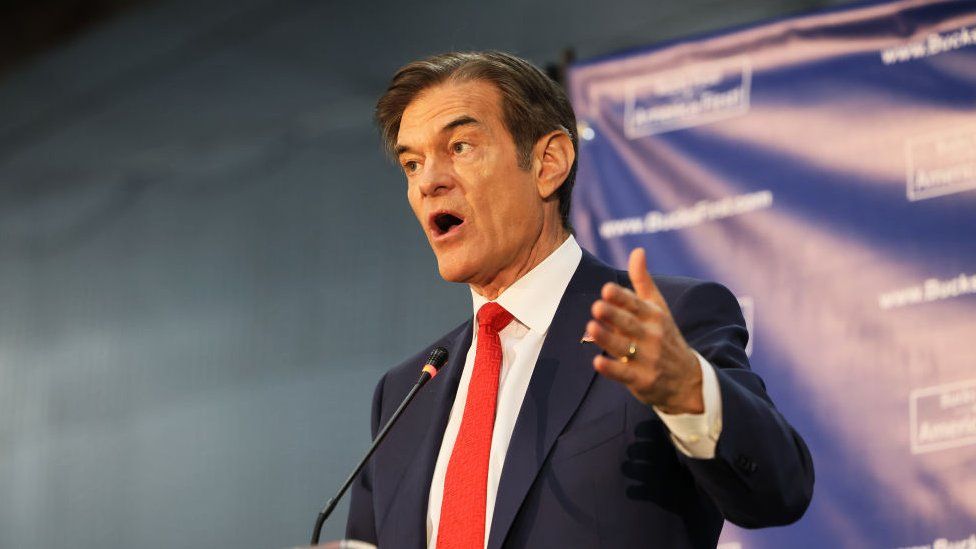ARTICLE AD BOX
 Image source, Getty Images
Image source, Getty Images
Dr Mehmet Oz at a campaign event in May - he has been the subject of allegations about research on animals
By Bernd Debusmann Jr
in Washington
Even in a Senate race already marred by insults and mudslinging, the term "puppy killer" stood out.
The term - directed at Trump-backed Pennsylvania Senate hopeful Dr Mehmet Oz - followed a report by the US news website Jezebel that said research led by Dr Oz had killed at least 329 dogs as well as dozens of pigs and hundreds of rabbits and rodents.
While a spokesman for Dr Oz denied the claim and said "only an idiot" would believe it, the celebrity doctor's political opponents were quick to pounce. His election rival, Democrat John Fetterman, branded him "sick" and began selling "Dog Lovers for Fetterman" campaign stickers
His wife, Gisele Fetterman, also piled on the pressure. "We know what the stakes are in this election... add one more: PUPPIES," she tweeted.
The allegations against Dr Oz came as he was closing the distance in the polls against Mr Fetterman with just one month to go until the 8 November midterm elections.
"When you frame someone as a puppy killer, it's controversial. It's attention-grabbing," Syracuse University Professor Jennifer Stromer Galley, who researches the political impact of social media, told the BBC.
"America loves its dogs," she added. "To be on the wrong side of this particular story is hard as a candidate."
The claims, some experts believe, could be the latest example of what is known as an "October surprise" - news stories that have the potential to upend campaigns and influence voters shortly before the November elections.
Here are some other notable - and varied - October surprises.
1980: Iran Hostages
The term "October surprise" comes from the 1980 electoral race between then-President Jimmy Carter and Ronald Reagan, who reportedly feared that a last-minute release of US hostages held in Iran would boost Mr Carter in the polls.
Ultimately, the hostages were released on the same day as Reagan's inaugural address.
Image source, Getty Images
Image caption,Then-President Reagan at an event welcoming hostages home from Iran in January 1981
Some - including former Iranian President Abdulhassan Banisadr - later claimed that Reagan conspired with Iran to keep the hostages from being released before the election.
Two congressional investigations, however, found no evidence that this was the case.
2000: A George W Bush revelation
During the tight final days of the 2000 presidential race between George W Bush and Al Gore, Fox News revealed that Mr Bush had been arrested for drunk driving 24 years earlier in 1976.
While Mr Bush became president, his adviser and strategist Karl Rove later said he believed the news had cost the campaign five states. In a later book, Mr Rove accused Al Gore's press secretary of spreading the news to tip the election.
"The timing of the DUI disclosure - four days before election day, with the candidates tied in the polls - was suspicious," Mr Rove wrote.
The Gore campaign denied any involvement.
2012: Mitt Romney's "47 percent"
Just weeks before Americans headed to the polls to cast their ballots for Mitt Romney or Barack Obama, video emerged of Mr Romney in which he was seen telling a group of campaign donors that "47 percent" of voters would vote for Mr Obama "no matter what".
Image source, Getty Images
Image caption,Mitt Romney later said that the revelation of his "47 percent" comment damaged his campaign
He added that 47% of voters "believe they are victims" and that "government has a responsibility to care for them".
The videotape immediately put Mr Romney's campaign on the defensive, while Mr Obama's team made mentions of it a fixture of last-minute campaign ads and interviews.
"That hurt," Mr Romney told Fox News. "There's no question that hurt and did real damage to my campaign".
2016: Trump and Clinton
The 2016 presidential election between Hillary Clinton and Donald Trump saw a number of last-minute surprises that experts speculated could upset the election.
In early October of that year, a 2005 video emerged showing soon-to-be President Trump saying that "you can do anything" to women "when you're a star". He later apologised.
The very same day, WikiLeaks unveiled emails from John Podesta - who was then chair of the Clinton campaign - which included portions of speeches she gave to Wall Street banks.
Lastly, on 28 October - 11 days before the election - then-FBI Director James Comey announced he would take "appropriate investigative steps" to examine Mrs Clinton's use of an unsecured private email server.
"[It] upended the news cycle, and soon halved Clinton's lead in the polls, imperilling her position in the Electoral college," US writer and FiveThirtyEight founder Nate Silver wrote the following year.

 2 years ago
44
2 years ago
44








 English (US) ·
English (US) ·